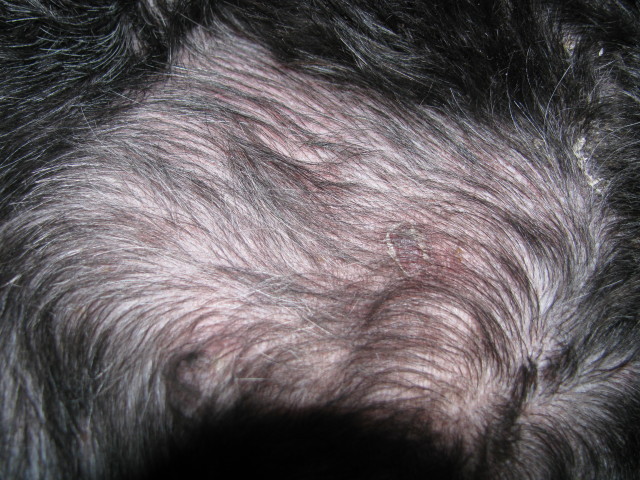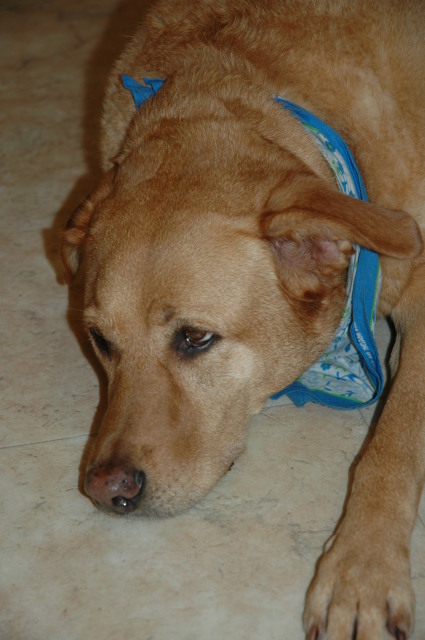QuestionLast week, I brought home an eight month old Airedale. This morning, I dropped her off to be spayed. She was so extremely nervous, they had to give her a sedative before I could go.
She's been nervous in the new house, jumpy around car sounds, and seems to have a deep concern about doors. I met the breeder before bringing her home, and she lived in a big house with several other dogs, but the big appeal of this particular breeder was all the one-on-one attention the puppies were given. The dogs lived *in* the house and were cat-socialized, as well. I've been chalking her nerves up to anxiety about going from being a low-ranking "pack member" to an only puppy, but the nurse at the vet's office suggested her anxiety seemed a bit extreme.
She also said that if unchecked, this kind of anxiety can turn into aggression easily, and that Airedales are known for aggressive behaviors. Is Holly's extreme nervousness something I should be concerned about? How else can I help her to feel comfortable, so we don't end up with a hostile dog?
AnswerHi Elizabeth,
Thank you for writing to me about your precious puppy. I am sorry about the delay in responding. My computer has been crashing and it's been extremely difficult to catch up on questions. Thank you for your patience.
I do agree that you should be concerned about your dog's stress level. What you want is a dog who is happy and confident. I am going to make some suggestions.
~Ask your vet to do a full biomedical blood workup, paying special attention to the results of her thyroid test.
~Put 12 drops of Rescue Remedy in her water bowl and rub some on her gums a couple of times a day.
~Start working with a trainer on all the basic commands. Set your dog up for success.
~Make sure that your puppy gets an extensive amount of vigorous exercise.
~Work with a trainer using positive reinforcement to desensitize your puppy from her fear triggers. You would have to continue the work throughout each day and build up your dog's level of confidence.
~As soon as a class will accept her, take her for agility training.
~Speak to your vet about doggie xanax.
~There is a product called an Anxiety Wrap. You can find it on www.sitstay.com/ Many people have found that it helps their dogs with anxiety and loud noises.
~Using Melatonin can reduce your dog's anxiety level. Dr. Nicholas Dodman and his colleague Dr. Linda Aronson of the behavioral section at Tufts New England Veterinary Medical Center had been looking for something that would help reduce canine thunderstorm phobias when they discovered research papers on the effect of melatonin. Research indicated a positive effect of melatonin on dogs that continually lick their flanks as well as a calming effect on chickens in overcrowded conditions.
Drs. Dodman and Aronson wondered whether melatonin might work on noise phobic dogs. The first dog to try it was Dr. Aronson's own Bearded Collie who had severe thunder phobia after lightening struck very near her house. The effect of the melatonin was dramatic. The dog simply stopped being afraid instead of tearing around the house and digging at the carpets. The melatonin did not put her to sleep, she stayed awake and alert -- just not bothered by the thunder.
Drs. Dodman and Aronson then gave the melatonin to other dogs and produced the same result. Melatonin worked for other noise fears (one dog was afraid of songbirds) as well, including fireworks!
Melatonin is sold in capsules and tablets in health food stores, pharmacies and some supermarkets. It is sold in doses as low as 200 micrograms (mcg.). For most dogs, Aronson prescribes 3 milligrams (mg.) In a few cases, dogs weighing over one hundred pounds needed 6 mg. but that was unusual. Aronson usually gives dogs that weigh less than 30 pounds, 1.5 mg. Although they have not treated any phobic really tiny dogs, Aronson would reduce the dosage further for them.
It's important to read the labels on melatonin bottles very carefully. Some are mixed with herbs or nutrients that may not be safe for dogs. Make sure you buy the correct dosage for your size dog. Remember, there are 1,000 micrograms (mcg.) in a milligram (mg.) so a 200 mcg. pill contains only 1/15 of the amount recommended for a large dog.
Because melatonin is not regulated by any federal agency, the quality varies greatly from manufacturer to manufacturer. If an inferior product is administered, it may not be effective in calming a dog whereas a higher quality product might be. Purchase the product from a supplier you trust and believe in. Some holistic veterinarians sell melatonin and their products might be better quality.
You can give your dog melatonin every day. It remains effective for several hours. You can also give her Melatonin before taking her out. Give melatonin immediately when you see your dog becoming agitated. If your dog has automimmune disease or severe liver or kidney disease, check with your veterinarian before giving melatonin.
~Some pet owners have alleviated their dog's anxiety by dispensing Calm Pet by NutraBest/Natural Pet Nutrition which contains valerian, chamomile, kava kava, St. John's wort and melatonin.
~The use of DAP-PHEMERONES can also reduce anxiety. This is the hormone that is expelled by the mother of the litter and is calming to the puppies. Farnam is one company that makes it. There are others as well. Do a web search for Comfort Zone DAP for the best pricing.
~Be sure that your dog is crate trained. Dogs who are crate trained look to their crates for security.
Using some of these techniques in conjunction with one another should have a positive effect on your dog's high anxiety. Be sure to keep yourself calm because dogs pick up on the energy around them and absorb it.
Enjoy your beautiful puppy. The work you put in now to develop your dog's personality, will turn your pooch into the dog of your dreams.
Best Regards,
Shelley Davis

 Identifying the breed
Question
Unknown Dog
Greetings Patti, I would li
Identifying the breed
Question
Unknown Dog
Greetings Patti, I would li
 Dry Dog Foods
Question
Prince Duke & Princess
I have two B
Dry Dog Foods
Question
Prince Duke & Princess
I have two B
 Dog fur is flaking off, scabbing, itching like crazy
Question
zacks tummy
Hi,
We have a four-year-old cockap
Dog fur is flaking off, scabbing, itching like crazy
Question
zacks tummy
Hi,
We have a four-year-old cockap
 Potty problems
Question
QUESTION: Hii Okay i have a 6 month old
Potty problems
Question
QUESTION: Hii Okay i have a 6 month old
 Senior dog not eating
Question
Meggie Girl
I will be so grateful if you can h
Senior dog not eating
Question
Meggie Girl
I will be so grateful if you can h